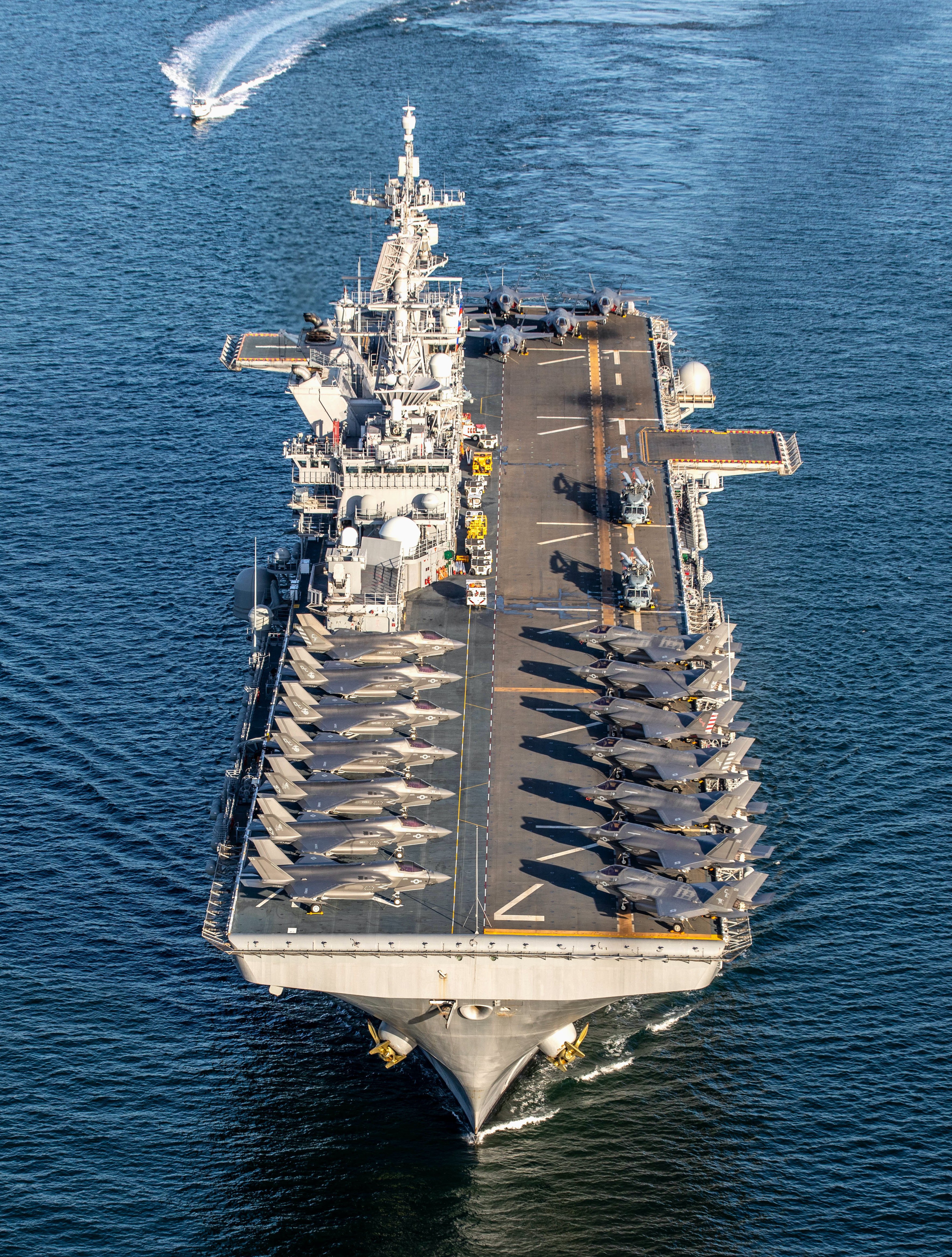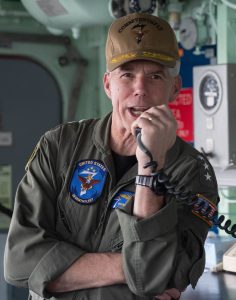
ANNAPOLIS, MD., — This summer’s experimentation with the amphibious assault ship USS Tripoli (LHA-7) explored how an America-class big-deck amphibious warship can better work in concert with a carrier strike group, the commander of U.S. 7th Fleet said Friday.
With F-35B Lighting II Joint Strike Fighters aboard for several months, Tripoli experimented with what some are calling the “assault carrier” concept, Vice Adm. Karl Thomas said Friday during an event co-hosted by the Center for Strategic and International Studies and the U.S. Naval Institute.
“One day you can have F-35Bs on the flight deck, the next day you could have MV-22s and you can be putting Marines ashore. And so it just is a very versatile instrument and the fact that you have 14 5th-gen fighters on board – it’s an incredibly capable sensor,” Thomas said. “And so we’re still in the experimentation phase. We wanted to at least try to find out how would you integrate an assault carrier with a full-sized carrier. What missions might it be able to do?”
The experimentation on Tripoli was part of an evolution of the Navy and Marine Corps’ “lightning carrier” concept on big-deck amphibious warships. In June, Tripoli participated in exercise Valiant Shield with carriers USS Abraham Lincoln (CVN-72) and USS Ronald Reagan (CVN-76).
“What we found is we distributed our three large decks for a period of time,” Thomas said of Valiant Shield.
“There’s mission sets that I think that it’ll be designed for. I think that there are regions where it can operate in a better capacity. And then I think that because of the vertical takeoff nature of the F-35, you can find yourself putting F-35s in [Expeditionary Advanced Base Operations] and maybe bring them back out to the ship for some maintenance and you move them elsewhere,” he added. “Maybe you latch them up with the carrier and you use the command and control of the electronic countermeasure capability of the [E2-D Advanced Hawkeye and the EA-18G Growlers]. So we’re still in the experiment phase.”

Thomas pointed to the United Kingdom Royal Navy’s experimentation with a squadron of U.S. Marine Corps F-35Bs and Royal Air Force F-35Bs operating on carrier HMS Queen Elizabeth (R08) and Japan flying the F-35B off the Japanese helicopter destroyer JS Izumo (DDH-183) as examples of allied nations also using the aircraft.
“So it also allows our allies and partners to see the capability you can bring with F-35Bs on the flattop,” he said.
Thomas also discussed Beijing’s reaction to House Speaker Nancy Pelosi’s (D-Calif.) trip to Taiwan earlier this year. He described the military drills and missile firings in response to the visit as “irresponsible.”
“I think that we have a responsibility through the Taiwan Relations Act to provide a defensive capability to Taiwan and to make sure that we’re ready and we are. Our desire would be to have a peaceful resolution of cross-strait differences,” he said. “The PRC says that that’s their desire, but when you see them fire ballistic missiles over Taiwan and have them land in the maritime commons and the shipping lines and some of them actually landed in the Japanese economic exclusion zone – that’s why I attach that word, irresponsible.”
Thomas also noted last week’s trilateral ballistic missile exercise between the United States, Japan and South Korea in the Sea of Japan after North Korea fired intermediate-range ballistic missiles over Japan.
“Certainly Japan itself is looking at its own ballistic missile defenses. But I would also tell you the PRC has ballistic missiles,” Thomas said.
“Having ballistic missile defense is not only to protect our allies and partners, it’s to protect ourselves and our ships are extremely capable. And so having that ballistic missile defense capability is something that I would want on every one of my [cruiser-destroyer] ships just from a multi-domain capability.”





